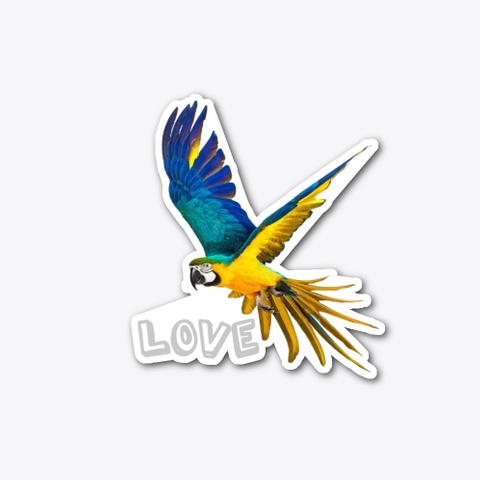Check out our merchandise
 Macaws are inherently noisy birds. To a certain extent, screaming is natural for them, but if you have a bird that screams to offending levels, then you must understand the reason why it is behaving like this and how control the noise.
Macaws are inherently noisy birds. To a certain extent, screaming is natural for them, but if you have a bird that screams to offending levels, then you must understand the reason why it is behaving like this and how control the noise.
Why do they do it?
Parrots are very vocal birds. Macaws use vocalizations to communicate with others. They usually live in flocks because they feel safer. Other reasons for being in a flock include the chance of finding food easily and socializing. When macaws communicate with their flock they have to be audible enough in the continuous singing and squawking of the rest of the birds.
Certain macaw species celebrate the rising and setting of sun with their squawks and songs. Screaming is often used to warn the flock of imminent danger. At your home, if your pet macaw is scared of something or someone, it may do the same thing. This is normal and will last for a short period of time. However, if your parrot screams ceaselessly then you may have a problem. You do not have a happy bird and your bird won’t have a happy family.
Excessive screaming can happen for the following reasons:
- Your bird may be sick. Take your macaw to a vet to rule out the possibility of an illness.
- Nutritional problems in your macaw can also have your bird change the vocalization levels.
- Macaws often get stressed about a change in the members of your family. An addition to the family or the loss of a family member often leads to change in the behaviour of your macaw and it can include unwanted screaming.
- Fear of something in the house can also make your macaw scream excessively.
- Boredom and loneliness can make them scream for attention.
- Jealousy because of the addition of another pet or family member can also make your macaw scream. Here’s a great guide to how to train your parrot!
Types of screaming
Contact calls
Macaws use contact calls when they get separated from their flock. They call out to reunite with their flock. Other birds of the flock call back so that they can locate the lost macaw. When your bird is in captivity it feels abandoned and it tries to call you so that it can be reunited with its human flock.
If you do not answer in a timely manner, your macaw’s calls get louder and persistent. Usually you come back to the room when the screams are unbearable. Your pet macaw realizes that it has to scream to get a reply from you.
How to handle this:
Use contact call of your own in the form of a whistle or a phrase or a word which will give your bird the security that you are around and you will be coming to it soon. Make sure you answer when your bird calls in a pleasant way. Do not wait for your bird’s calls to get aggressive before you answer. Your bird will gradually realize the level of noise you prefer and call for you the same way.
[quads id=2]
Raising an Alarm
Macaws raise alarms when something is wrong. Watch out for these calls before they turn into screams. Someone may have added soggy pellets to their water dish or they may be hungry or sick.
How to handle this?
If you are observant of your bird’s alarm calls, things will be taken care of and your bird will not enter the screaming phase. Make sure your macaw is tended to in a timely manner, it will understand that you will take care of it without having to get highly vocal.
Seeking attention
Macaws enjoy your attention. If they feel that they are not getting your attention they may try to reach out for you through screaming. The fact is that most of us react to our bird’s screams quicker than their usual calls. This makes them believe that the best way to look for attention is by screaming.
How to handle this?
Your macaw likes to get your attention. If you may not be able to give undivided attention to your macaw, get a variety of toys that can keep it busy. This will mean that your macaw will be able to keep itself entertained when there is no one around.
Baby macaws that scream for food
Very often baby macaws are force weaned at a very early age. This makes the bird very insecure when you bring it home. It ends up crying endlessly for food.
How to handle this?
This is simple, you have to feed your bird. Baby macaws who scream for food need the security of a person who can feed them. Successful owners feed their birds with their hands. This drives your macaw away from its food begging behaviour when it realizes that food will be provided and it is at a safer place now.
Obsessive screaming
Sometimes, the macaws you bring home may have gone through abuse and neglect which makes screaming a part of their nature. These macaws need an extremely patient owner and a lot of care. It takes time to change such behaviour which has been deeply ingrained in their brains.
How to handle this?
Utmost care is the best way to handle screaming macaws who have gone through neglect. These birds have a profound lack of simulation and they can be mellowed with care. Leaving the television on or keeping the radio on can let your bird into believing that it is not on its own.[quads id=2]
Tips and Tricks:
Keep your bird in a stimulating environment where it has toys to play with and food to keep itself busy.
Allow your bird to exercise by flying or flapping their wings.
Many macaw owners keep a perch for their pet in every room so that the macaw can sit on the perch while you do your work. This keeps the bird from feeling lonely and bored.
If you think that screaming back at your bird can help you control the situation then you may be in for a surprise. Your macaw will end up enjoying it and scream more to hear you back. Avoid responding to your macaw when it screams. Wait for a break between its screams and then answer. This will make the macaw realize that you prefer to talk to it when it is quieter.





